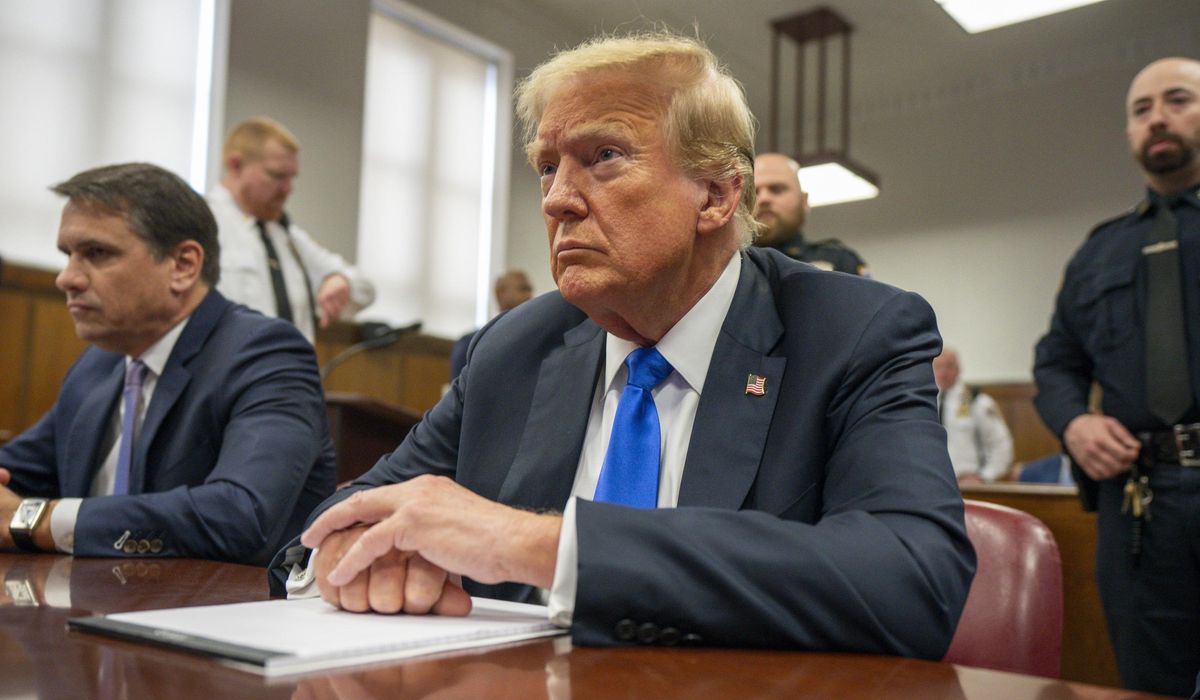


NEW YORK — A defiant President-elect Donald Trump received his no-jail sentence Friday in a surreal and historic hearing just days before his return to Washington as the leader of the free world.
He told State Supreme Court Judge Juan Merchan that the trail, conviction and sentencing was a “great embarrassment” for the state of New York.
“This has been a very terrible experience, I think it’s been a tremendous setback for New York,” Mr. Trump told the court before hearing the already determined sentence for a felony business fraud conviction. “I’m totally innocent, I did nothing wrong.”
The president-elect also accused Manhattan District Attorney Alvin Bragg of attacking him and defended his behavior, saying accountants legitimately logged the business records at the heart of the case.
“I get indicted for business records — everyone should be so accurate,” Mr. Trump quipped.
Mr. Trump also listed pundits who said the case was bogus, griped about trial witnesses and the judge’s decisions, and pointed to voters who ignored the case and elected him to office.
“I got the largest number of votes by far of any Republican candidate in history,” he said. “I’m the first president in history who was under a gag order.”
Judge Merchan underscored the severity of Mr. Trump’s felonies and the jury’s decision to find him guilty of falsifying business records, though let the president-in-waiting walk free under a lenient course known as an unconditional discharge.
The judge had little wiggle room in sentencing Mr. Trump, the first former president and president-elect to face criminal prosecution. Incarceration and probation were effectively off the table since Mr. Trump will be inaugurated as president on Jan. 20.
“It is the legal protections afforded to the office of the president of the United States that are extraordinary, not the occupant of the office,” Judge Merchan said. “One power they do not provide is the power to erase a jury verdict.”
He said the protections afforded to presidents do not “reduce the seriousness of the crime” and Mr. Trump, as a regular citizen, would not have enjoyed the same treatment that he is receiving.
“Never before has this court been presented with such a unique and remarkable set of circumstances. This has been a truly extraordinary case,” Judge Merchan said.
He said that “once the courtroom doors were closed,” the case was just like any other, with citizens reviewing evidence and delivering a verdict.
Mr. Trump, who previously served as president from 2017 to 2021, did not want to face the ignominy of a sentencing hearing 10 days before his triumphant return to the White House. He wanted the case to be overturned completely.
Mr. Trump’s attorneys said prosecutors infringed on Mr. Trump’s presidential immunity with certain evidence at trial, and that the president-elect should have enjoyed the same protection from criminal prosecution that sitting presidents enjoy. The U.S. Supreme Court and state appellate judges rebuffed their pleas.
Manhattan District Alvin Bragg had argued in favor of sentencing Mr. Trump before the inauguration.
“Defendant makes the unprecedented claim that the temporary presidential immunity he will possess in the future fully immunizes him now, weeks before he even takes the oath of office, from all state-court criminal process,” Mr. Bragg told the Supreme Court. “This extraordinary immunity claim is unsupported by any decision from any court.”
Unlike the trial, which featured a rotating cast of GOP lawmakers in the courtroom and protesters in a park outside, the sentencing was a subdued affair. Mr. Trump did not appear in person, so the layers of security that dotted the trial did not appear this time.
Also, the outcome of the sentencing was known ahead of time, so the only guesswork was about the tenor of the hearing and what would be said.
Judge Merchan said he would authorize the release of audio of the proceedings, once it concluded.
A Manhattan jury convicted the former president in May of falsifying business records in an attempt to hide hush money payments to porn actress Stormy Daniels. He was found guilty of all 34 counts.
During the trial, prosecutors said Mr. Trump criminally concealed payments to Ms. Daniels around the 2016 campaign with an intent to violate election laws.
The payments were designed to keep Ms. Daniels quiet about an alleged sexual encounter about a decade earlier in Lake Tahoe. Mr. Trump says the encounter did not happen.
Prosecutors said Mr. Trump paid Ms. Daniels through Michael Cohen and concealed reimbursements to the lawyer in 2017 by misidentifying checks.
Mr. Trump’s lawyers said he was busy running the country and thought he was paying Mr. Cohen for legal services, so his team logged the checks in that manner. They also accused the prosecution of using novel legal theories to mount a political hit job against Mr. Trump’s presidential campaign.
The multi-week trial kept Mr. Trump trapped in a dingy courtroom in lower Manhattan for weeks while the GOP primary unfolded. However, Mr. Trump turned the courthouse hallway into his personal campaign stage and easily won the Republican Party presidential nomination before defeating Vice President Kamala Harris in November.
• Tom Howell Jr. can be reached at thowell@washingtontimes.com.
